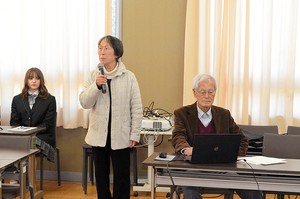THE ASAHI SHIMBUN
November 10, 2021 at 17:25 JST
 Three top executives of Kansai Electric Power Co. in 2016: Shosuke Mori, left, chairman; Shigeki Iwane, vice president; and Makoto Yagi, president (Asahi Shimbun file photo)
Three top executives of Kansai Electric Power Co. in 2016: Shosuke Mori, left, chairman; Shigeki Iwane, vice president; and Makoto Yagi, president (Asahi Shimbun file photo)
OSAKA--Prosecutors here dropped their case against nine former top executives of Kansai Electric Power Co. who accepted hundreds of millions of yen in suspected kickbacks, citing a lack of evidence.
A major obstacle appeared to be that the main witness in the scandal is dead, sealing off any chance of proving bribery and aggravated breach of trust.
The case revolved around cash and gifts given to the individuals by Eiji Moriyama, a former deputy mayor of Takahama, Fukui Prefecture, where Kansai Electric operates a nuclear power plant. Moriyama died in 2019 at the age of 90.
A citizens group that had pushed for criminal charges against them was outraged by the Nov. 9 decision by the Osaka District Public Prosecutors’ Office not to hand down indictments and is set to petition a committee for the inquest of prosecution to pursue the case.
The former top executives include Shosuke Mori and Makoto Yagi, who both had served in the post of chairman; Shigeki Iwane, a former president; Hideki Toyomatsu, a former senior vice president; and Yasuhiro Yashima, a former auditor.
A third-party panel that looked into their suspected misconduct stated that 83 individuals, including the former executives, received cash and gifts to the value of 370 million yen ($3.3 million) over more than 30 years from the Moriyama side.
The panel also found that the Osaka-based utility paid out a total of 260 million yen to compensate for a cut in remuneration for its directors following a rise in electricity rates after the Fukushima nuclear accident triggered by the 2011 earthquake and tsunami disaster. The payouts were made from July 2016 to October 2019.
Kansai Electric also made arrangements so that the directors at the time would be reimbursed for lost income after they retired and parachuted into part-time positions as advisers to the company or in another capacity.
A special team of investigators at the prosecutors office examined whether the acceptance of cash and gifts, which the nine acknowledged they received, constituted bribery or aggravated breach of trust under the Company Law.
They also concluded that the executives did not cross the line when they awarded construction projects to companies linked to Moriyama.
When questioned about the cash and gifts, the executives all said they “had them in their keeping.”
To prove bribery, investigators needed to present evidence that Moriyama “made unlawful requests” to those officials.
But that proved to be impossible after Moriyama’s death, according to investigative sources.
With regard to compensating the directors for their losses in remuneration, tax authorities determined in July that it amounted to “hiding income” and ordered the company to pay a heavy additional tax.
In a lawsuit the company lodged against its former management responsible for the decision to cover the difference in income, Kansai Electric acknowledged that the payments were not meant to reward the officials for their part-time positions after retiring as directors.
However, investigators concluded that the former directors fulfilled some responsibilities in their part-time positions and that the management’s decision to provide payouts did not constitute aggravated breach of trust.
A team of lawyers representing seven of the accused, including Mori, welcomed the prosecutors’ decision, calling it “fair and appropriate.”
In an interview with The Asahi Shimbun, a Kansai Electric representative withheld comment on the prosecutors’ decision on grounds the company is not one of the parties concerned.
(This article was written by Shoko Matsuura, Arata Namima and Kengo Kamo.)




















A peek through the music industry’s curtain at the producers who harnessed social media to help their idols go global.
A series based on diplomatic documents declassified by Japan’s Foreign Ministry
Here is a collection of first-hand accounts by “hibakusha” atomic bomb survivors.
Cooking experts, chefs and others involved in the field of food introduce their special recipes intertwined with their paths in life.
A series about Japanese-Americans and their memories of World War II